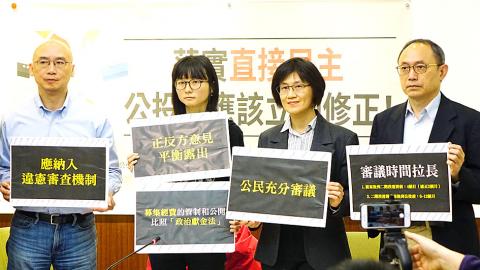A coalition of civic groups yesterday urged the Legislative Yuan to prolong referendum proposals’ review periods and introduce more measures to ensure the quality of proposals.
“Referendums should facilitate public discussion on important issues, and ensure human rights and social justice, but last year’s referendums failed in both regards,” Covenants Watch convener Huang Song-lih (黃嵩立) told a news conference in Taipei.
On Nov. 24 last year, three referendums that limited LGBT rights were passed — including one intended to push for a same-sex partnership law over an amendment to the definition of marriage in the Civil Code.

Photo: George Tsorng, Taipei Times
The results sparked heated debate over whether there should be an additional law banning human rights issues being put to referendums and whether such referendums are constitutional.
To improve the quality of referendums, the Central Election Commission’s review period of each referendum proposal should be prolonged from 30 to 60 days to four to six months, he said.
To allow more public discussion and prevent misinformation, there should be a waiting period of six to 12 months for every referendum before its scheduled voting date, he said.
Currently, referendums can be held as soon as 28 days after they pass the commission’s final review, during which period the commission is required to host at least five debates on the referendum, he said.
“Twenty-eight days are definitely not enough. That is only enough time to spread rumors, not enough to ensure public discussion of important issues,” he added.
Requiring each referendum proposal to go through a combined 18-month period before the public can vote on it might sound like a long time, but it is relatively short compared with the time required in other nations, National Chengchi University law professor Lin Chia-ho (林佳和) said, adding that in Switzerland the process typically takes more than 40 months.
“Referendum results have the same effect as a law, but while legislators must go through a complex process to pass a law, passing a referendum is very easy,” Lin said.
To help the public make informed decisions about referendums, the government, especially the Legislative Yuan and Executive Yuan, should clearly explain each referendum’s effect and state their opinions in advance, he said.
Meanwhile, to prevent unconstitutional referendums from being held, the commission should have the option of asking the Council of Grand Justices to review referendum proposals that could be unconstitutional, he said.
Members of the public should also have the right to ask for a constitutional review by the council if they are concerned about whether a proposal is unconstitutional, he added.
Election rules on the limits and transparency of political donations should apply to donations for referendum proposals to ensure fairness, Taiwan Association for Human Rights secretary-general Chiu Ee-ling (邱伊翎) said.
An unequal distribution of resources turned last year’s referendums into “tools for manipulation by rich political parties and corporations,” she said, adding that the results reflected “democratic backsliding.”
With more referendums expected to be held next year, the Legislative Yuan should make the necessary amendments to the Referendum Act (公民投票法) by the end of this legislative session to prevent the same problems from reoccurring, she said.

Taiwan is stepping up plans to create self-sufficient supply chains for combat drones and increase foreign orders from the US to counter China’s numerical superiority, a defense official said on Saturday. Commenting on condition of anonymity, the official said the nation’s armed forces are in agreement with US Admiral Samuel Paparo’s assessment that Taiwan’s military must be prepared to turn the nation’s waters into a “hellscape” for the Chinese People’s Liberation Army (PLA). Paparo, the commander of the US Indo-Pacific Command, reiterated the concept during a Congressional hearing in Washington on Wednesday. He first coined the term in a security conference last

DEFENSE: The National Security Bureau promised to expand communication and intelligence cooperation with global partners and enhance its strategic analytical skills China has not only increased military exercises and “gray zone” tactics against Taiwan this year, but also continues to recruit military personnel for espionage, the National Security Bureau (NSB) said yesterday in a report to the Legislative Yuan. The bureau submitted the report ahead of NSB Director-General Tsai Ming-yen’s (蔡明彥) appearance before the Foreign and National Defense Committee today. Last year, the Chinese People’s Liberation Army (PLA) conducted “Joint Sword-2024A and B” military exercises targeting Taiwan and carried out 40 combat readiness patrols, the bureau said. In addition, Chinese military aircraft entered Taiwan’s airspace 3,070 times last year, up about

A magnitude 4.3 earthquake struck eastern Taiwan's Hualien County at 8:31am today, according to the Central Weather Administration (CWA). The epicenter of the temblor was located in Hualien County, about 70.3 kilometers south southwest of Hualien County Hall, at a depth of 23.2km, according to the administration. There were no immediate reports of damage resulting from the quake. The earthquake's intensity, which gauges the actual effect of a temblor, was highest in Taitung County, where it measured 3 on Taiwan's 7-tier intensity scale. The quake also measured an intensity of 2 in Hualien and Nantou counties, the CWA said.

The Overseas Community Affairs Council (OCAC) yesterday announced a fundraising campaign to support survivors of the magnitude 7.7 earthquake that struck Myanmar on March 28, with two prayer events scheduled in Taipei and Taichung later this week. “While initial rescue operations have concluded [in Myanmar], many survivors are now facing increasingly difficult living conditions,” OCAC Minister Hsu Chia-ching (徐佳青) told a news conference in Taipei. The fundraising campaign, which runs through May 31, is focused on supporting the reconstruction of damaged overseas compatriot schools, assisting students from Myanmar in Taiwan, and providing essential items, such as drinking water, food and medical supplies,